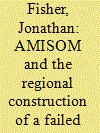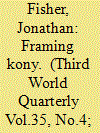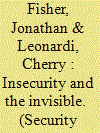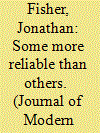|
|
|
Sort Order |
|
|
|
Items / Page
|
|
|
|
|
|
|
| Srl | Item |
| 1 |
ID:
165974


|
|
|
|
|
| Summary/Abstract |
Somalia, for many analysts, is the paradigmatic ‘failed state’, as well as the site of numerous external interventions since 1991. However, while early interventions were designed and directed by international actors, more recent peace operations have been led by regional states. The current African Union Mission in Somalia, AMISOM, has been presented by its supporters and financiers as a novel ‘African solution’ to a putative ‘African problem’. This article seeks to challenge analyses of AMISOM and other African peace operations that contrast ‘international’ approaches with ‘local’ or ‘African’ approaches, focusing instead on the region as a unit of analysis. In doing so, the study uses archival and interview data to interrogate how regional politico-military elites have viewed Somalia, their role within it and the kind of political authority they have wished to see established there since the genesis of AMISOM. The article finds that regional elites have sought to use AMISOM to impose a particular version of statehood on Somalia, based in both neo-Weberian institutionalist theory and their own domestic political experiences. This has entailed not only the rejection of central manifestations of Somali political authority but also the regional construction of Somalia itself as a failed state.
|
|
|
|
|
|
|
|
|
|
|
|
|
|
|
|
| 2 |
ID:
138341


|
|
|
|
|
| Summary/Abstract |
Debate on the ‘securitization’ of aid and international development since 9/11 has been anchored in two key claims: that the phenomenon has been driven and imposed by western governments and that this is wholly unwelcome and deleterious for those in Africa and elsewhere in the developing world. This article challenges both of these assumptions by demonstrating how a range of African regimes have not only benefited from this dispensation but have also actively encouraged and shaped it, even incorporating it into their own militarized state-building projects. Drawing on the cases of Chad, Ethiopia, Uganda and Rwanda—four semi-authoritarian polities which have been sustained by the securitization trend—we argue that these developments have not been an accidental by-product of the global ‘war on terror’. Instead, we contend, they have been the result of a deliberate set of choices and policy decisions by these African governments as part of a broader ‘illiberal state-building’ agenda. In delineating this argument we outline four major strategies employed by these regimes in this regard: ‘playing the proxy’; simultaneous ‘socialization’ of development policy and ‘privatization’ of security affairs; making donors complicit in de facto regional security arrangements; and constructing regime ‘enemies’ as broader, international threats.
|
|
|
|
|
|
|
|
|
|
|
|
|
|
|
|
| 3 |
ID:
133263


|
|
|
|
|
| Publication |
2014.
|
| Summary/Abstract |
This article explores the influence of actors and organisations outside the corridors of power in Washington, DC on US 'crisis foreign policy making' in Africa. Focusing on the case of US policy towards the lra/northern Uganda crisis - particularly the Obama administration's 2011 decision to send 'combat-equipped US forces' to pursue the rebel group across central Africa - it is argued that the role of African governments themselves merits greater consideration. The decision to send in these 'military advisers' was arguably strongly influenced by campaigns run by Western policy institutes, notably the International Crisis Group, and US advocacy groups since around 2007. The Ugandan regime of Yoweri Museveni has - it is suggested - nevertheless itself fundamentally shaped the nature and direction of the debate into which such groups have entered. This raises crucial questions about the agency of African governments in Western 'crisis' decision-making fora.
|
|
|
|
|
|
|
|
|
|
|
|
|
|
|
|
| 4 |
ID:
169778


|
|
|
|
|
| Summary/Abstract |
ON 15 FEBRUARY 2018, HAILEMARIAM DESALEGN, Ethiopia’s beleaguered prime minister, resigned. Bowing to pressure from within his own party,1 the Ethiopian People’s Revolutionary Democratic Front (EPRDF), Hailemariam declared that he hoped to facilitate an end to ‘unrest and political crisis’ in the country by leaving the national stage.2 If Hailemariam’s departure had taken observers by surprise, however, what was to follow would defy all predictions. His successor, Abiy Ahmed—whose elevation was unanticipated even by many within the EPRDF Politburo itself3—has, since his April 2018 inauguration, presided over a dramatic set of iconoclastic policy shifts. Perhaps most high profile amongst these has been the securing of a rapprochement with Eritrea, Ethiopia’s most bitter regional nemesis since the outbreak of a border war in May 1998.
|
|
|
|
|
|
|
|
|
|
|
|
|
|
|
|
| 5 |
ID:
182650


|
|
|
|
|
| Summary/Abstract |
The search for security has become an almost permanent feature of the contemporary lived experience and what Brian Massumi has called an ‘operative logic’ for states across the globe. The modern study – and practice – of security has, nonetheless, been largely concerned with the protection, preservation and sustaining of the material, the tangible and the visible. For many people around the world, however, feelings of security also derive from understandings of an individual or community’s relationships with invisible and spiritual forces. Religious devotion and divine protection represent a central plank of security for many, just as fears of divine retribution, demonic possession or witchcraft feature as a central dimension of insecurity for many others. This remains, however, a significant blindspot in much of security studies – and, indeed, often eludes and challenges state authority as much as it intersects with and enhances it. Drawing on fieldwork undertaken in northwestern Uganda, this study reflects critically on the provenance and implications of this blindspot and argues for an expanded understanding of what ‘counts’ as (in)security. In doing so, the article emphasizes the global character of spiritual (in)security and the challenges an understanding of (in)security that encompasses this pose to longstanding scholarly and practitioner associations of (in)security with state authority.
|
|
|
|
|
|
|
|
|
|
|
|
|
|
|
|
| 6 |
ID:
115824


|
|
|
|
|
| Publication |
2012.
|
| Summary/Abstract |
This article explores Uganda's decision to send peacekeeping troops to Somalia in 2007 as part of the African Union Mission in Somalia (AMISOM) and argues that the intervention has as much to do with Uganda's relationship with its donors as it has with maintaining regional stability - the official justification for intervention. Museveni's decision to intervene in Somalia is the most recent example of his regime's multi-pronged 'image management' strategy in which the President has involved Uganda in numerous foreign and domestic activities to ensure that donors perceive his government in a particular way vis-à-vis their interests: as an economic success story, a guarantor of regional stability, or, in relation to Somalia, an ally in the global war on terror. In so doing Museveni's strategy, conceptualized here within a constructivist framework, has been able largely to avoid censure in areas of traditional donor concern such as governance, thereby achieving a considerable degree of agency in a seemingly asymmetric relationship.
|
|
|
|
|
|
|
|
|
|
|
|
|
|
|
|
| 7 |
ID:
120913


|
|
|
|
|
| Publication |
2013.
|
| Summary/Abstract |
This article explores the role of perceptions in donor-African relations and the extent to which donor 'images' of African governments can be managed by these same governments to their advantage. The article focuses on donor views of 'reliability' in the Global War on Terror (GWOT) and compares differing international perceptions of Kenya and Uganda through this lens. Arguing that donors have an exaggerated sense of Ugandan 'compliance' or reliability and Kenyan unreliability in fighting terrorism, it explains this by examining the two governments' international 'image management' strategies, or lack thereof. The analysis contends that Uganda's success at promoting itself as a major donor ally in the GWOT, compared with Kenya's general reluctance to do the same, has played a significant role in building and bolstering these differing donor perceptions. This, the article suggests, raises important questions about the nature of African agency in the international system.
|
|
|
|
|
|
|
|
|
|
|
|
|
|
|
|
|
|
|
|
|